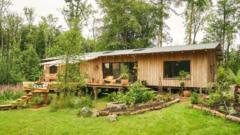Can This Couple Save Their £150,000 Eco House by Going Green?

Published: 2025-10-19 22:00:15 | Category: wales
The story of Abigail and Marcus Beck illustrates the challenges and triumphs of creating sustainable living spaces under Wales' One Planet Development (OPD) policy. This innovative approach allows individuals to construct eco-friendly homes while adhering to strict sustainability criteria. However, the Becks must prove their commitment to a green lifestyle or risk losing their £150,000 family home.
Last updated: 16 October 2023 (BST)
Key Takeaways
- One Planet Development (OPD) policy allows zero-carbon homes in Wales.
- The Becks' eco-home was built with careful consideration of sustainability.
- They face strict monitoring for five years to prove their green lifestyle.
- The couple used innovative materials and techniques to keep costs manageable.
- Community engagement plays a significant role in their food production.
Understanding the One Planet Development Policy
The One Planet Development policy was established in Wales to promote sustainable living. It allows for the creation of eco-homes on land that typically wouldn’t receive planning permission. Under this policy, developers must demonstrate the ability to live sustainably, which includes producing their own food, sourcing energy, and managing water usage effectively.
The Becks' journey highlights the complexities of this approach. By integrating modern living with eco-conscious practices, they aim to contribute positively to their local community and the environment.
The Becks' Eco-Home Journey
Abigail and Marcus Beck's journey started with a vision for a sustainable family home. The couple, both passionate about eco-living, decided to build their home in the woods of Pembrokeshire. As Abigail, a former BBC Wales reporter, explains, the OPD policy scrutinises every aspect of their lives, from food sourcing to transportation. Their commitment to sustainability is not just about building a house; it’s about fostering a lifestyle that aligns with their values.
Building with Purpose
The Becks began construction in 2023, guided by Marcus's design expertise. He owns a design company and crafted the home with practicality and environmental impact in mind. The total cost of the project reached £150,000, with the couple relying heavily on their savings and support from family members when challenges arose.
“The big challenge was choosing the right materials, which often cost more,” Marcus shared, reflecting on the hurdles they faced. They opted for sustainable materials, including:
- Second-hand glazing for windows
- Rigid wood-fibre board insulated with recycled newspapers
- Wood sourced from local trees at risk of disease
These choices emphasised their commitment to sustainability while also addressing the challenges posed by budgeting and material selection.
Challenges and Setbacks
Like any significant construction project, the Becks' journey was fraught with difficulties. During the build, they experienced setbacks, such as rainwater leaking through tarpaulins, leading to material warping. These issues tested their resolve, but they pressed on, determined to complete the project. Their experience underscores the importance of resilience in sustainable building projects.
Food Production and Community Engagement
Integral to their sustainable lifestyle, the Becks have established a communal garden that aims to provide 35% of their food. This not only reduces their carbon footprint but also fosters a sense of community. The couple’s commitment to local sourcing and sustainable practices demonstrates how eco-living can thrive in harmony with nature.
As Abigail noted, “You have to be able to live a modern lifestyle, but it doesn't have to be hugely carbon-hungry.” This philosophy encapsulates their approach to sustainable living, blending modern comforts with eco-friendly practices.
Monitoring and Compliance: The Five-Year Challenge
Under the OPD policy, the Becks will be monitored for the first five years. They must provide evidence of their sustainable living practices, including annual reports and financial accounts. Failure to meet these requirements could result in the loss of their home, a reality that weighs heavily on them.
“If we don’t meet the requirements, we could be chucked out,” Marcus added, emphasising the stakes involved. This stringent monitoring highlights the accountability expected of those living under the OPD policy.
The Role of Renewable Energy
One of the key components of their eco-home is its reliance on renewable energy sources. The Becks have invested in a solar power system that supplies a significant portion of their energy needs. This not only reduces their carbon footprint but also promotes energy independence.
“At the moment, we have a great solar power system and tonnes of energy,” Abigail commented, reflecting on the benefits of their investment. Renewable energy plays a crucial role in their commitment to a sustainable lifestyle.
Final Thoughts: A Vision for the Future
The Becks' story is one of determination and creativity. Completing their home in July 2023, they expressed no regrets about their choices. Instead, they are eager to challenge perceptions of sustainable living and demonstrate that it is possible to live harmoniously with nature while enjoying a modern lifestyle.
“I remember feeling like 'I am determined to prove you wrong',” Abigail said, highlighting their commitment to making a difference. Their journey serves as an inspiration for others considering eco-friendly living and showcases the potential of sustainable initiatives in Wales.
FAQs
What is One Planet Development (OPD)?
One Planet Development (OPD) is a Welsh policy that allows for the construction of zero-carbon homes on land that would not typically receive planning permission, provided that developers can demonstrate sustainable living practices.
What are the requirements for OPD housing?
Residents must provide evidence that they can produce their own energy and water, as well as a basic income from the land. They are also subject to strict monitoring for five years to ensure compliance with sustainability standards.
How much did the Becks' eco-home cost to build?
The total cost of the Becks' eco-home was approximately £150,000, including materials and construction costs.
What challenges did the Becks face during construction?
The Becks encountered several challenges, including water leaks, material warping, and budgeting issues, which required them to rely on family support to complete the project.
How does the communal garden contribute to their lifestyle?
The communal garden aims to supply 35% of the Becks' food, promoting sustainability and community engagement while reducing their reliance on external food sources.
As the Becks continue their journey towards sustainable living, their story raises important questions about the future of eco-homes in the UK. How can we encourage more individuals to adopt a green lifestyle? What role do policies like OPD play in shaping our communities? #EcoLiving #SustainableHomes #OnePlanetDevelopment



